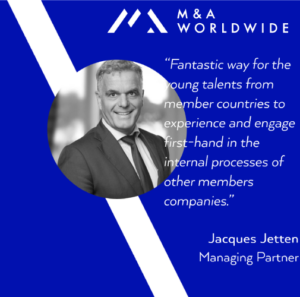MAWW Young Talents – Going Global
The idea for the young talent exchange happened some years ago and has since seen exchanges between the US, the Netherlands, Argentina, Poland and France.

Jacques Jetten, MAWW partner from the Netherlands and Mario Caramutti, MAWW partner from Argentina, explained that it is a fantastic way for the young talents from member countries to experience and engage first-hand in the internal processes of other member companies. It is also a very useful tool to build relationships between member countries and gain knowledge and experience.
Usually, those involved in the exchange spend 50 % of their time working on their own ongoing projects and the other 50% working on an exchange ongoing project. They also have time to explore and socialise with the teams in the country they are visiting. Recently Aeternus, Netherlands and FGA, Argentina had an exchange for 3 weeks. Normally the exchanges are two weeks, but because of the geographical implications, another week was added on.
Cultural differences between countries and their internal work processes are also highlighted, for example in Europe the majority of marketing is digital whereas in Argentina, there is still a very personal touch and phone calls are a very important part of their marketing outreach. Another difference is that each country has its own due diligence process and legal system, it gives those involved an insight into processes that they would not have seen otherwise. The valuation process is also unique to each country, so it is also useful for them to see how it is measured in each geography.
| “it is a way to keep young talent engaged in their jobs and provides a very good working relationship between the MAWW partners involved |
Although this is an investment, each member continues to pay the salary of their team member and pay for flights, accommodation and a per diem. The rewards are vast, it is a way to keep young talent engaged in their jobs and provides a very good working relationship between the MAWW partners involved. It is also a great motivational tool to keep young talent in-house as they feel appreciated and invested in and on their return they have a de-brief where they can share what they have learnt and possibly incorporate different techniques. This is an opportunity for all MAWW members to invest not only in their team members but also in increasing their relationships with other members, something to be applauded.
|
Food for Thought – Post-Exchange
What else also might be found about this topic:
Talent exchange programs typically include a post-exchange service requirement—which is an agreement to continue working in the company for a set time, often equal to the duration of the exchange—and a financial penalty for not meeting it, generally the direct cost of the exchange. Such mechanisms are designed to prevent exchanges from being only beneficial for young talents.
Some exchange programs noted the possibility for exchange-related attrition, however, all the experiences reported have been very positive. Furthermore, several managers said that commitment to the company counterbalances the attraction of looking for a better job. One employee who exchanged to another company said, “I believe in the mission.”
Reintegration appears to be easier for staff who do not experience disconnection from their companies while on exchange—including those who remain in routine contact with their manager, those who develop a post-exchange plan with their manager and those who do shorter or part-time exchanges. As noted by one participant, who did a part-time exchange, “I didn’t come back to a foreign place.”
Finally, it is important to design and implement evaluations and to develop mechanisms for sharing what has been learned to highlight the benefits of the exchanges. Both efforts require dedicated time from exchange program managers, preferably those with evaluation expertise.